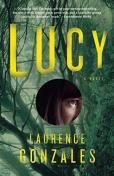BKMT READING GUIDES
Lucy (Vintage)
by Laurence Gonzales
Paperback : 307 pages
2 clubs reading this now
1 member has read this book
Introduction
Primatologist Jenny Lowe is studying bonobo chimpanzees deep in the Congo when she is caught in a deadly civil war that leaves a fellow researcher dead and his daughter, Lucy, orphaned. Realizing that the child has no living relatives, Jenny begins to care for Lucy as her own. But as she reads the late scientist’s notebooks, she discovers that Lucy is the result of a shocking experiment, and that the adorable, magical, wonderful girl she has come to love is an entirely new hybrid species—half human, half bonobo.
Editorial Review
Questions for Laurence Gonzales on Lucy
Q: The premise of Lucy is a daring one. How did you come up with the idea of a girl who is part ape?
A: I was studying petroglyphs in the high desert country of New Mexico around 1994. There is something deliciously spooky and mysterious about that country. As I was walking out there all alone, looking at those eerie pictures that someone had made maybe 1,000 years ago, I had this vision of a girl coming out of the rocks from an ancient time--this beautiful creature emerging into sunlight. It struck me that she was half human and half something else, something very ancient. I was transfixed by her. Something about her appearance made me think that she was a cross between a human and an ape. And I thought: This is really possible now. A world of possibilities opened up.
Once I had fixed on the idea, I couldn’t put it out of my mind. I was working in Hollywood at the time, writing screenplays, so my first attempt to write Lucy was actually a screenplay. But it wasn’t right. It took me the next 14 years to work it out. A few years ago I was talking with Cormac McCarthy and he asked me what I was writing next. I told him that I was writing a novel and he asked why I would want to do that, since there hadn’t been a really good novel written in decades. I nearly quit working on Lucy at that point because it was so discouraging. But in the summer of 2007, my younger daughter, Amelia, was home from college and I told her the premise of the novel. When she heard it, she insisted that I press on. She peppered me with ideas and notes of encouragement until I had completed a first draft. Then I showed it to my wife, Debbie, and my older daughter, Elena, and they both exploded with excitement about Lucy. So I was moved to really go all the way with it.
Q: Why did you decide to focus on bonobos as opposed to another type of ape?
A: Bonobos are no more plausible than chimpanzees as potential candidates for breeding with humans. In fact, my original idea was for a cross between a chimpanzee and a human. But then around 2005, I was doing research for my book Everyday Survival and was looking into the origins of humans. I heard that the largest colony of bonobos in the world was just an hour from my home in Milwaukee. So I went there to meet them. I fell in love with them. They’re sexy and clever, and they have complex language and a matriarchal social structure in which the guys do what the women tell them to do. As they got to know me better, they would come to the wire at the back of the enclosure and put their fingers through the fence, imploring me to touch them. Their hands are beautiful and so very human. There seemed no way to write Lucy without them.
Like Lucy herself, these bonobos are caught between two worlds. They can’t go back to Congo, even if we allowed it. They’re not fit for living in the wild and even if they survived, they’d be killed by bush meat hunters there or by the civil war. And yet it is so sad that they are kept in a cage. I am working to make it possible for people who read Lucy to donate money to improve their living quarters.
Q: In Lucy you tackle many serious moral and ethical issues, but at the center of it all is the question of what it means to be human. Did writing Lucy’s story help you see this question in a different light?
A: Just as science has no fixed definition of what it means to be male or female, it also has no clear way to define what it means to be human, unless we apply a strict genetic definition. And even then it gets murky. Using genetics, you could argue that someone with any genetic mutation is not human, and I don’t think we’re ready to do that. Many scientists argue, for example, that chimpanzees and bonobos should be classified as another variety of our species, Homo sapiens, or that humans should be considered another form of chimpanzee.
My face-to-face contact with bonobos, along with my research into our ancestors--the apes and early humans--made me see that we are essentially apes with all of our ape-like behaviors still intact. The first time I went to meet the bonobos in the Milwaukee Zoo, I walked up to the very thick glass behind which they lived. I looked in on a dozen or so of those individuals who were engaged in various activities--grooming and talking and climbing around. As I stood there, one of them came flying at me from somewhere high above on the end of a long rope and kicked me in the face with all his weight and momentum. If it had not been for the glass, he’d have snapped my neck and killed me. That was such a wonderfully human thing to do--to kill the stranger, as so many of us are still doing. A moment later, he was tenderly kissing another bonobo. Writing Lucy definitely shaped the way I view humans. We are still so close to our roots.
Q: Some of the most heart-wrenching scenes in the novel come from the reactions of certain groups to Lucy once the public learns about her story. Were you drawing parallels to any particular instances of intolerance that we face in society today?
A: The story I told about the bonobo who wanted to kill me illustrates the roots of our intolerance of those who are not like us. It is in our nature to protect our own group and reject other groups. The bulk of the novel was written during the administration of George W. Bush, during which violent intolerance was elevated to the level of a national ideal. Add to that the staggering ignorance, religious fanaticism, and power-mad dishonesty of that group of people, and you get a pretty good idea of what I was aiming for in the novel. I actually went into prisons and met some of the white power fanatics there. You don’t have to look very far to find the kind of people I write about in Lucy.
Q: Is there an underlying message that you hope readers will take away from reading Lucy?
A: Lucy does indeed raise many ethical, moral, and philosophical issues that are useful to think about and debate. One important issue we haven’t touched on yet is the way people think about other animals. Recent scientific study shows us that many animals are extremely intelligent and even self-aware. Some birds, for example, have consciousness that is not unlike our own. Whales and dolphins are very likely just as smart as we are. I hope that people come away from reading Lucy with a greater respect for animals of all sorts and perhaps a greater reluctance to destroy them simply because they don’t understand them. I also think it’s important to point out that I wrote most of this novel between the ages of 59 and 61. Part of what kept me going was that I had had the privilege of knowing Norman Maclean, the author of A River Runs Through It, who didn't start writing until he was in his seventies. I hope that this book serves as an inspiration to others. It’s never too late, so never give up.
But at its heart, Lucy is a coming-of-age novel about a wonderful young girl discovering herself and the world in which she finds herself. Lucy says it herself: All teenagers have feelings like hers. The message is: Lucy is a novel. It’s a story, and as such, it’s meant to make people turn the pages and laugh and cry. If they happen to have deep thoughts along the way, that’s good, too. But if all Lucy does is to make you stay up late reading, then that’s enough for me.
Discussion Questions
No discussion questions at this time.Book Club Recommendations
Recommended to book clubs by 0 of 0 members.
Book Club HQ to over 88,000+ book clubs and ready to welcome yours.
Get free weekly updates on top club picks, book giveaways, author events and more








